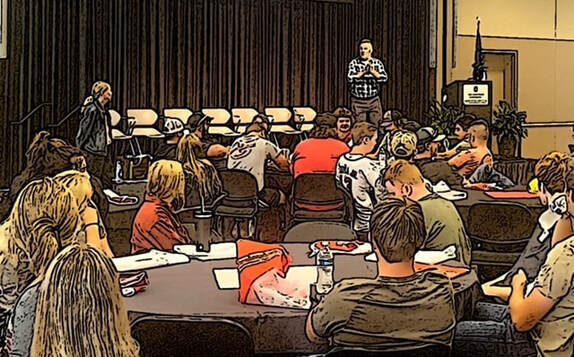|
(About a 7-minute read)
Over my career as a team building facilitator, I have gravitated towards resources or tools that are made up of three parts. For example, the "What? So What? Now What?" processing model. The Traffic Light norming tool, "What do we want to stop doing (red)? What do we want to be cautious of (yellow)? And what do we want to go for (green)?" The typology of team interactions - Team Bonding, Team Building and Team Development. I've found threes are easy for me to remember and they are simple to introduce but hold a wonderful complexity when we dive in.
I recently found another threes tool, a little different than some of my others. It's not a three-parter, but a three-word phrase, "What's Important Now," or W.I.N. - The acronym is what I'm practicing to remember. I've put this W.I.N. in my toolbox as an in-the-moment assessment tool. Let me share a little information from the source to lead you into how I connected this tool to my work as a team builder. W.I.N. is from the book, Essentialism: The Disciplined Pursuit of Less, by Greg McKeown (2014). The acronym is found in the section titled "Focus." McKeown credits, "What's important now?" to Larry Gelwix, a High School Football coach. Gelwix and McKeown share some insights about W.I.N. in relation to individual and team applications. As you read these insights, consider how they can relate to a team builder and even to the group a team builder is working with. (NOTE: If you find yourself 'reacting' to some of the words included in the insights, try to consider other ways the words can be interpreted.)
Below I share how I made the connections between the insights and team building. But before you read what I'm thinking, what are you thinking right now? If you're struggling with the semantics (e.g., game & playing), what else can the words mean? (Recently I heard Tim Farriss say, "We want to know what game we're playing, so we know how to play effectively and efficiently." If you're holding the word 'game' in your mind as a negative thing, consider a metaphor meaning.)
From my facilitator perspective, if I get too focused on something that didn't just work (first insight), I will miss the next opportunity to do a better job. "What's important now?" snaps me back to the moment - to "right now" (second insight) so I can "operate at my highest level of contribution" (third insight). By focusing in on the "here and now" my group and I can continue to make headway toward their desired outcomes - sticking to the strategies we're learning to meet the outcomes (third insight).
From a group's perspective, after I introduce the tool to them, they can also use the W.I.N. reminder. Individuals can self-reflect 'in-the-moment' to determine what's important at any given time (first insight).
Now, as team builders, we know that working out a problem that just took place might be the most important thing to do in that moment - using W.I.N. prompts the reflection to make the choice to stop or move on without dwelling on past behavior. For individuals, using W.I.N. can help remind them about how they are "playing" in the moment (second insight). Is what they're doing helpful to the group or not helpful? And what choices do they want to make moving forward. How can individuals unite in ways that contributes to the group's strategies for success? Finally, how does each person operate within their "highest level of contribution" (third insight) to the group? And how does the group find out about, encourage and support these contributions? W.I.N. is a new tool for me. I'm ready to experiment with what it can do. At times when his groups are 'stuck' unable (or unwilling) to move forward, my friend Tom Leahy likes to ask them, "Would you like a tool?" If they are interested, he provides them with one he believes could help them overcome their barrier. I've learned to use Tom's question with my own groups. Now I'm excited to share this one at the right time, with the right group.
All the best,
Chris Cavert, Ed.D.
P.S. Would you like a super-quick update when new OnTeamBuilding content is posted? Just fill out the form below and then click the big blue button. I'll keep you posted.
0 Comments
(About a 5-minute read.)
I first read about 'lagging indicators' from a new-year focused (2023) blog post from Ryan Holiday (author and Stoic thought leader - I created the activity, Obstacle Reflection using quotes from one of his books). A lagging indicator is an "output measurement" (according to a quick Google search). As Holiday puts it, "All success [or lack of it] is a lagging indicator." Lagging indicators give us vital data.
Specific to team building, what does success look like to you? What personal success do you consider? What contextual success do you measure? More often than not, I measure success in relation to the goals I set for myself. For example, one of my ongoing goals is to try a new activity (or a unique variation of an old favorite) during each program I facilitate. My lagging indicators (outcome measurements) show up in relation to how well I prepared for the new activity. I've found that the more time I spend thinking about and writing out the activity the better the outcomes - I've taken the time to prepare myself. I put in the work. In Holiday's post, he says: Nothing comes from nowhere. Not success. Not inspiration. Not the muses. Not writer's block. Everything is a lagging indicator of whether or not you did the work.
Using lagging indicators as data is important to our growth as team builders. It's why there is a lot of advice about taking time to reflect on your facilitation immediately after a program (intraspectively and/or with other facilitators). Here are a handful of after-program reflections:
After-program reflection does not need to take a lot of time (unless you want it to). Use indicators to identify what's working - recognize and repeat. (Don't forget to celebrate the goodness!) Then determine what didn't work well (maybe just one thing) and make a plan to change it for next time. In most cases, based on my experience, when I've planned well with purpose, programs go well. When I put in the work and create of program I believe will lead my groups' to their outcomes, I see more 'success.' (It's that old saying, "You get out of it what you put in.") Moving Forward What are some of the lagging indicators you want to work on? How are your processing skills? How are you feeling about 'opening' programs? How are you at wrapping up or 'closing' a program? Do you know enough activities to plan for a wide range of diverse groups (if you want to work with a wide range)? How are your online team building facilitation skills? How much work needs to go into meeting your goals? Can you (will you) put in the time? Lagging indicators will show you where to focus the work. All the best, Chris Cavert, Ed.D.
P.S. Would you like a super-quick update when new OnTeamBuilding content is posted? Just fill out the form below and then click the big blue button. I'll keep you posted.
|
OnTeamBuilding is a forum for like-minded people to share ideas and experiences related to team building. FREE Team Building
Activity Resources OTB FacilitatorDr. Chris Cavert is an educator, author and trainer. His passion is helping team builders learn and grow. Archives
January 2024
|




 RSS Feed
RSS Feed